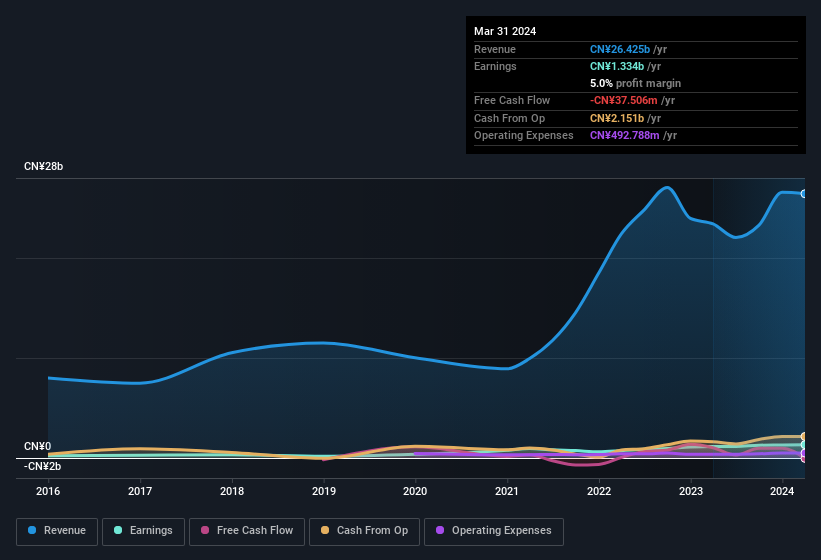- China
- /
- Oil and Gas
- /
- SHSE:605090
We Think That There Are Issues Underlying Jiangxi Jovo Energy's (SHSE:605090) Earnings

Jiangxi Jovo Energy Co., Ltd (SHSE:605090) announced strong profits, but the stock was stagnant. We did some digging, and we found some concerning factors in the details.
View our latest analysis for Jiangxi Jovo Energy

A Closer Look At Jiangxi Jovo Energy's Earnings
In high finance, the key ratio used to measure how well a company converts reported profits into free cash flow (FCF) is the accrual ratio (from cashflow). The accrual ratio subtracts the FCF from the profit for a given period, and divides the result by the average operating assets of the company over that time. You could think of the accrual ratio from cashflow as the 'non-FCF profit ratio'.
That means a negative accrual ratio is a good thing, because it shows that the company is bringing in more free cash flow than its profit would suggest. While it's not a problem to have a positive accrual ratio, indicating a certain level of non-cash profits, a high accrual ratio is arguably a bad thing, because it indicates paper profits are not matched by cash flow. That's because some academic studies have suggested that high accruals ratios tend to lead to lower profit or less profit growth.
For the year to March 2024, Jiangxi Jovo Energy had an accrual ratio of 0.23. Unfortunately, that means its free cash flow fell significantly short of its reported profits. In the last twelve months it actually had negative free cash flow, with an outflow of CN¥38m despite its profit of CN¥1.33b, mentioned above. We saw that FCF was CN¥1.0b a year ago though, so Jiangxi Jovo Energy has at least been able to generate positive FCF in the past.
That might leave you wondering what analysts are forecasting in terms of future profitability. Luckily, you can click here to see an interactive graph depicting future profitability, based on their estimates.
Our Take On Jiangxi Jovo Energy's Profit Performance
Jiangxi Jovo Energy didn't convert much of its profit to free cash flow in the last year, which some investors may consider rather suboptimal. Because of this, we think that it may be that Jiangxi Jovo Energy's statutory profits are better than its underlying earnings power. Nonetheless, it's still worth noting that its earnings per share have grown at 14% over the last three years. At the end of the day, it's essential to consider more than just the factors above, if you want to understand the company properly. So while earnings quality is important, it's equally important to consider the risks facing Jiangxi Jovo Energy at this point in time. For example, we've found that Jiangxi Jovo Energy has 2 warning signs (1 is concerning!) that deserve your attention before going any further with your analysis.
This note has only looked at a single factor that sheds light on the nature of Jiangxi Jovo Energy's profit. But there are plenty of other ways to inform your opinion of a company. For example, many people consider a high return on equity as an indication of favorable business economics, while others like to 'follow the money' and search out stocks that insiders are buying. While it might take a little research on your behalf, you may find this free collection of companies boasting high return on equity, or this list of stocks that insiders are buying to be useful.
If you're looking to trade Jiangxi Jovo Energy, open an account with the lowest-cost platform trusted by professionals, Interactive Brokers.
With clients in over 200 countries and territories, and access to 160 markets, IBKR lets you trade stocks, options, futures, forex, bonds and funds from a single integrated account.
Enjoy no hidden fees, no account minimums, and FX conversion rates as low as 0.03%, far better than what most brokers offer.
Sponsored ContentNew: Manage All Your Stock Portfolios in One Place
We've created the ultimate portfolio companion for stock investors, and it's free.
• Connect an unlimited number of Portfolios and see your total in one currency
• Be alerted to new Warning Signs or Risks via email or mobile
• Track the Fair Value of your stocks
Have feedback on this article? Concerned about the content? Get in touch with us directly. Alternatively, email editorial-team (at) simplywallst.com.
This article by Simply Wall St is general in nature. We provide commentary based on historical data and analyst forecasts only using an unbiased methodology and our articles are not intended to be financial advice. It does not constitute a recommendation to buy or sell any stock, and does not take account of your objectives, or your financial situation. We aim to bring you long-term focused analysis driven by fundamental data. Note that our analysis may not factor in the latest price-sensitive company announcements or qualitative material. Simply Wall St has no position in any stocks mentioned.
About SHSE:605090
Jiangxi Jovo Energy
Provides clean energy integrated service for gas industries in China and internationally.
Very undervalued with flawless balance sheet.
Market Insights
Community Narratives



